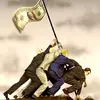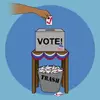
Proud Kulak by @Thorvald (El Thorvaldo)
When the Bolshevik Party overthrew the Russian Provisional Government in 1917 (7 November Gregorian reckoning, 25 October Julian reckoning), it promised to transform society in accordance with the orthodox Marxist prediction that industrial capitalist oligarchies would be subsumed by empowered worker collectives.
There was just one problem: the Russian peasantry.
The class struggle theorized by Karl Marx and Friedrich Engels in The Communist Manifesto presupposed that by the time society reached the endstage capitalism conducive to proletarian revolution, the peasant sector would have been rendered extinct. Instead, despite rapid industrial progress throughout the preceding decades, Russia remained decidedly agrarian, with a peasant population vastly dwarfing the industrial workers, who remained concentrated in a handful of urban enclaves. There simply wasn't a large enough proletariat, let alone a bourgeoisie, to foster a natural revolution.
So Lenin invented both.
The end of serfdom and stuttering reforms of the late imperial age had empowered the peasants to expand their farmland, their livestock, and their equipment. With hard work and dedication, a farmer might amass enough financial stability to hire on his neighbours. Inevitably, success attracts envy, and a nickname, kulak (Ukrainian: kurkul; "fist") emerged to describe such successful peasants.
In the absence of a substantial bourgeois class, Alexander Shlikhter, People's Commissar for Food Collection in Ukraine, fabricated a target and set the peasantry upon itself. Whereas 'kulak''s original connotations are unclear and its usage pre-Revolution was obscure, the Bolsheviks turned it first into a formal class category, and then a general denouncement of anyone who resisted their control. Gathering together the least successful, least productive, most opportunistic peasants into collaborationist cadres dubbed "poor peasants' committees" (komitety nezamozhnykh selian; "komnezamy"), Shlikhter unleashed a brutal war on the peasantry to confiscate grain to feed the Red Army embroiled in the larger Civil War. It backfired spectacularly: in August 1919, the Bolshviks were driven out of Kyiv as peasant uprisings exploded across Ukraine, gravitating toward the anarchist leader Nestor Makhno and Cossack general Nikifor Grigoriev.
The "cruel lesson of 1919" would haunt the Soviet leadership for years afterward. Socialist but not authoritarian, communist but not Bolshevik—Ukraine was the first and most dangerous example of a Leftist counter-paradigm that resisted Moscow's control. A decade later, the kulaks were scapegoated again as both ideological enemies and an immediate obstacle to collectivized farming. Those that could not flee to the cities for factory labour were evicted, first to distant farms with poor soil, then deep into Siberia—the very first victims of Stalin's internal deportations, and early captives of the Gulag network. As collectivization fomented new rebellions in 1930 and agricultural mismanagement threatened famine across the Union, Soviet authorities returned to forced expropriation. But Stalin's paranoia extended beyond the peasantry: as mass starvation loomed in 1932 and Ukrainian apparatchiks began to resist the fantastical export quotas, he became consumed by fears of a second uprising—if not an outright Party schism—and saw an opportunity to crush Ukrainian resistance once and for all. Food requisition was intensified, stripping farmers even of their seed grain; entire communities were blacklisted for trade, with their existing equipment confiscated; and the republic's border was closed to prevent the starving populace from escaping. The result was genocide: the Holodomor.
And yet, though battered, Ukraine was not yet lost. The intelligentsia went to ground; Ukrainian Jews such as Volodymyr Zelenskyy's family kept their heads down, toeing the line and biding their time. When the last tattered threads of the Soviet dream finally succumbed to Soviet reality, Ukrainians proclaimed fresh independence 24 August 1991. The fist rose anew.
Lenin saw Ukraine as a resource to exploit; Stalin saw Ukraine as a threat to be destroyed. Small wonder 'kulak' became a slur under the Soviets: these hardy peasants not only refuted the practicality of collective farms, they proved that the honest worker could achieve modest prosperity without kowtowing to a dictatorial "vanguard party". Putin is certainly no Communist, but his war on Ukraine is guided by the same fears that consumed the Bolsheviks: that an independent people, following its own intuition, is living testament to the better future. And now, as then, Putin is learning that the Ukrainian kurkul is not so easily broken.
Perhaps it's time we reclaimed the word.
Stamp template by zilla774;
Fist adapted from Rafaelgr @ Wikimedia Commons.
Comments & Critiques (0)
Preferred comment/critique type for this content: Any Kind



Leave a Comment
You must be logged in and have an Active account to leave a comment.
Please, login or sign up for an account.